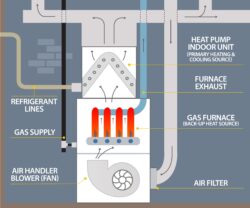
Are you considering the transition from a conventional natural gas furnace or heat pump to a dual fuel heating system? If you are, you’re likely acquainted with the traditional wisdom surrounding dual fuel HVAC systems.
At its core, dual fuel heating offers a more energy-efficient approach to heating your home, surpassing the choice of solely relying on natural gas or an electric heat pump. Many experts, including your local utility providers, advocate for dual fuel systems due to their potential cost savings and optimized performance by combining the strengths of both systems while mitigating their weaknesses.
Dual Fuel Systems Use A Heat Pump When It’s Cool, But Not Super Cold Outside. They Switch To Natural Gas When It Gets Cold.
Dual fuel systems typically employ a heat pump when the weather is moderately cool but not extremely cold. When temperatures drop significantly, the system switches to natural gas for more efficient heating. This concept sounds compelling, as it appears to offer the best of both worlds.
However, the reality is more nuanced. Dual fuel systems may not always be the most energy-efficient choice for every home in today’s rapidly evolving HVAC landscape. Instead of focusing solely on cost, it’s essential to consider comfort when contemplating an upgrade to dual fuel heating equipment.
HVAC Technology Is Changing
In theory, dual fuel heating makes sense, with electricity handling heating duties when outdoor temperatures exceed 40 degrees, and natural gas taking over as it gets colder. Yet, recent technological advancements and changes in gas prices have altered the equation. Fracking has made natural gas more accessible and affordable, making it an economical choice even during milder weather conditions. Moreover, modern heat pump technology has significantly improved, reducing the need for costly supplemental electric heating during colder spells.
Given these developments, the appeal of dual fuel heating may have waned for some homeowners. Factors like the availability of natural gas connections to your home and the condition of your existing heating system play crucial roles in making an informed decision.
Can Dual Fuel Improve Indoor Comfort
However, there is a scenario where dual fuel heating can enhance indoor comfort. If your home experiences excessive dryness during the fall and winter, causing discomfort to your skin, dual fuel heating may be a viable solution. Natural gas heating tends to produce hotter air, which can lead to drier indoor conditions compared to the warmth generated by heat pumps. So, if you’re sensitive to dryness and your home has gas lines, dual fuel equipment could offer the benefits of both gas and electric heating while minimizing comfort-related issues.
Whatever You Choose Your New HVAC Equipment Is Going To Be Good!
The choice between dual fuel heating and other alternatives depends on various factors, including your comfort preferences and your HVAC infrastructure. Modern heating equipment, whether dual fuel, gas, or heat pump, offers significant efficiency and operational improvements. Ultimately, prioritize your comfort when making your decision, as different heating sources provide distinct comfort-related advantages and drawbacks. The choice is yours, and your new heating system is bound to provide outstanding performance and efficiency, regardless of your selection.”
Tax Credit Information
Choosing these HVAC systems, you can get a $2000.00 per year for qualified heat pumps. Here are some links to helpful information about the tax credits.
iRS Energy Efficient Home Improvement Credit
Tax Credit Information
Areas We Serve







